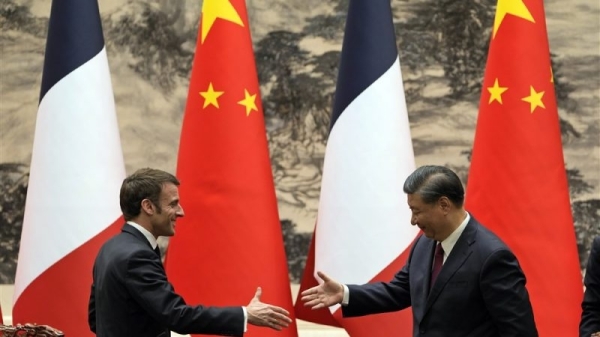France’s way of EU-China strategic autonomy

France’s ‘third-way’ diplomacy towards China is not new and not primarily premised upon ideology, but a recognition of a China ‘plus vieille que l’histoire’ and a France that needs to affirm its grandeur on the world stage, writes Lucie Qian Xia.
Following the hype around Macron’s state visit to China, China’s ambassador to France has now been swept into the ongoing geopolitical poly-crises surrounding the war in Ukraine. The cant about EU-China relations that permeates social parlance is embroiled in a debate about ‘winning the moral high ground’, amidst ideological disagreements between China and the West, most of the talks are lost in the mists of vacuous ‘decoupling’ and the US’s overt containment policy against China.
France’s ‘third way’
France’s diplomacy towards China is underpinned by its distinct historical place in Sino-Western relations. One of the most compelling contributions in France being the first major Western country to recognise the PRC and establish a diplomatic relationship with China in 1964.
This ‘diplomatic nuclear explosion’ during the height of the Cold War renders historical reverberations and an enduring impact on Sino-French relations.
De Gaulle rejected the polarisation that characterised the Cold War, providing France a unique ‘third way’ to drive an independent diplomatic stance, constituting France’s way to maintain a significant role that France must and should play in the world.
France’s ‘third-way’ diplomacy towards China is not new and not primarily premised upon ideology, but a recognition of a China ‘plus vieille que l’histoire’ and a France that needs to affirm its grandeur on the world stage.
Macron’s recent visit to China attests to France’s firm stance towards an independent policy from the US, in light of France finding solutions to the war in Europe and enhancing economic relations with China.
The visit sends a legion of symbolism: changing the logic of war and ‘decoupling’ to the sense of cooperation.
The visit also coincided with Le Festival Croisements, an annual cultural and intellectual dialogue between the two countries; this strong cultural component in Sino-French relations cannot be found nor replicated in China’s other diplomatic relationships.
Resilience in and of itself
The narrative of ‘decoupling’ cherry-picks evidence about China’s diplomacy insofar as China is relatively on board with some issues with the EU, is ambivalent about others, and opposes some others.
The reality is that the foundation and vitality of EU-China relations were never built upon a trenchant division between right and wrong but recognising that a relationship bridging Chinese and Western civilisations would benefit both peoples.
This year marks the 20th anniversary of the EU-China Comprehensive Strategic Partnership, which allows both sides to calibrate, communicate and confirm their commitment to openness and engagement.
Most importantly, the EU and China need to cultivate a relationship that is resilient in and of itself.
An eye-arresting look at the past ten years of EU-China relations is the infrequency of the EU-China High-Level Economic and Trade Dialogue, which is purported to be held annually for both sides to discuss issues of strategic economic and trade importance.
Since established in 2008, HED 3 was held in 2010, HED 4 in 2013, HED 5 in 2015, HED 6 in 2016, HED 7 in 2018, HED 8 in 2020 and HED 9 in 2022.
This lack of Track 1 economic diplomacy not only misses the mark but fundamentally underestimates diplomacy’s ability to be a vehicle for EU-China cooperation to adapt to the changing milieu in which it operates. It is vital for a reinvigoration of the EU-China Economic and Trade dialogue.
EU-China strategic autonomy
In all three of China’s policy white papers on the EU issued respectively in 2003, 2014 and 2018, China considers the EU a ‘major force in the world’ and values the necessity to ‘build strategic consensus and deepen mutual trust’ between the EU and China.
EU-China relations should not be premised on an attitude or a reaction policy. The current tic-for-tact style of diplomacy exhibited in the West’s engagement with China should be replaced by diplomacy sensitive to geopolitical circumstances and underpinned by strategic foresight.
One important area is climate action. The EU and China must deliberate how to further translate climate commitments into implementation.
In many ways, climate policy is foreign policy, and foreign policy is climate policy. The EU and China held their first High-level Environment and Climate Dialogue in 2021; since then, only two more ministerial-level dialogues have been held.
China and the EU – two of the world’s largest emitters and climate powers – should endeavour to accelerate climate cooperation amid geopolitical tensions.
Communication is the lubricant of a robust EU-China relationship. The EU and China should clearly define their strategic interests and diplomatic priorities.
Both sides need to be pragmatic about the potentialities for EU-China cooperation but also animated by the hope of a different and better one.



